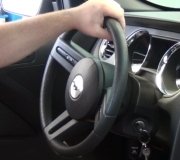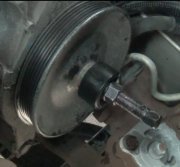Interesting interpretation of my response, but as we say in school, " what you heard is not what I said".
First of all, you didn't bother to elaborate on when this happens other than in dry weather. Does the car pull all the time? Just after braking for another half mile or so? Does the pull stop when you brake? Why make us guess? Does that mean the pull goes away when it's raining? That implies there's an alignment problem and the two front tires are steering in two slightly different directions. That alignment angle is called "toe". Alignments are considered maintenance repairs and are rarely covered under any warranty. The only alignments that are covered are those that are needed after covered parts have been replaced and they affect the alignment. Misadjusted toe will result in a feather edge pattern on both tires. Has anyone "read" the tire wear to see if that could be part of the problem?
Second, I told you my experience with service contracts with tvs and with cars, both my professions. In general they are very bad values for most car owners and tv owners. The fact that they saved you a lot of money is wonderful, and should hardly be interpreted as "picking your question apart? I've owned mostly Chrysler products since the '70s and the last three have cost less in repairs over the last 25 years than the cost of one service contract. I don't know what kind of cars you've owned in the past but it sounds like you've had expensive cars built with expensive parts and that are expensive to repair. For the average driver service contracts aren't a good deal. All professionals know that. You aren't the average owner. Hardly a reason to get in a snit.
Third, you said a warning light came on. I have to guess that's for the electronic stability control but you didn't say. You said there's a fault by which I'm guessing you mean a diagnostic fault code. Is that code top secret? Why didn't you say what that code is. You want me to tell you if it's related to the braking problem. How do you expect anyone to know that? Be aware too that fault codes never say to replace parts or that they're defective. They only indicate the circuit or system that needs further diagnosis. Your mechanic may need to drive the car with a scanner connected so he can view live data to see what is happening. It's possible there's a little corrosion in a connector, and that resistance is causing a wheel speed sensor's signal to drop out. The computer may interpret that as a slipping tire and the system may be trying to correct for that. The fault code might point to that.
Fourth, and this is the biggy, ... There is no way in the world we can know what's in your service contract, yet you want us to tell you if some unknown problem is covered. Most of those contracts have so many loopholes they look like Swiss cheese. The common ones cover "internally-lubricated parts". The better ones cover computers and other electronics. A few are provided through the manufacturer. Most contracts sold come through independent companies, even when you buy a new car and the dealer sells it to you. They love to sell those because 80 percent of what you pay goes to pay sales commissions. You said your contracts saved you a lot of money, and that's wonderful, ... For YOU, but in general they are not that good a value for most car owners. Luckily I worked for a very nice dealership, and they always mentioned that aftermarket service contracts were available, but they never pushed hard to sell them. The warranties through the manufacturer were pretty generous already. The contract may be in effect, but if your car is still under the manufacturer's warranty, that takes precedence. Until the manufacturer's warranty expires, you're paying for a contract that you can't collect on. That too may not apply to you since you bought a used car, but we have one well-known crooked new-car dealer who loves to push the contracts on young new-car buyers who don't think of that. Those contracts expire about the same time as the manufacturer's warranty, so they paid for a product they can't use.
Also be aware that most contracts have a small deductible, and that is usually for each repair, even when many are done at the same time. Some people come in with three unrelated problems, then are surprised when they're charged three deductibles. Another problem is getting those companies to pay the bills. You will have had fewer problems if you are a regular customer at your favorite shop, but the majority of new car dealers are fed up with waiting and fighting for payments that they now make the customer pay the bill, then let THEM collect from the insurance company. Those companies are a lot more responsive to the customers.
Finally, maintenance items are not covered with these contracts. You are guaranteed to spend $2200.00 in five years, and that seems to make you happy. I'd sell any car that cost me that much. I recently had to replace the $19.00 ignition coil on my '88 Grand Caravan daily driver, with 246,000 miles. Other than that I've replaced one fuel pump, one timing belt, lots of air filters and tires, and two headlight bulbs. Even if I paid someone else to do my repairs I wouldn't have spent half as much as you did.
One thing to remember though is my van has one Engine Computer and that's it. I have most of the toys and gimmicks newer cars have, like power windows and seats, but none of that stuff required an expensive and unreliable computer. Service contracts start to look better and better when you see what the manufacturers charge for replacement computers and programming them to your car. You're right that reading people's stories on this site can be depressing, but remember that for every car with an elusive problem, there's a hundred just like it on the road that are working properly. People don't post here to tell us their car is performing normally. I see the potential for expensive repair bills, and that's why I will always drive older stuff. There hasn't been a car produced by any manufacturer that I'd want to own in the last 20 years. It's also true that you see very few cars broken down on the side of the road compared to years ago, but a lot of those cars have the Check Engine light on or have some other issue that is being ignored.
As for my comment about cashing in the remaining amount of your contract to pay a repair bill, again, that probably doesn't apply to you. I'm just really frustrated with hearing, "what you need isn't covered". The mechanic is the car owner's advocate, not adversary, and we don't like high repair bills any more than you do. When the insurance company weasels out of paying a bill through some loophole, I'd encourage the owner to dump that product that failed to provide the expected benefit. If these contracts are a good value for you, wonderful, ... But they aren't for most of us.
As far as being "qualified", I was a suspension and alignment specialist for 16 years, then I taught it in a community college for 9 years. Brakes was also one of the areas I taught. With all my knowledge and experience I still can't answer your main question, and I doubt anyone could without experiencing a test drive. I understand you want to know if the repair will be covered, but first your mechanic will need to determine what is needed, then your service adviser is going to have to read your contract or call the company. Some of those companies can be pretty nice to work with; most are not. Some require the mechanic to do all kinds of tests first and to write, in detail, exactly what he found. Some will provide a list of additional information they require, and many want all the old parts back. I've known some mechanics too who will "fudge" their findings to fit what the insurance company will cover, because, again, they feel your pain of expensive repair bills.
Be aware too that very often the mechanic will be forced to do WAY more than is needed. A perfect example is broken wires between the door hinges. That's a common repair on any car brand that involves replacing those wires in the area where they flex. That is typically a two-hour job that you would pay for, and the mechanic would be paid for two hours labor. With the service contracts my dealer sold, we were required to replace the entire wiring harness with a brand new one. That involved removing the steering column and entire dash board, and disassembling all the doors. The job took more than six hours but the service contract paid for only four hours. Can you imagine the potential for cutting corners and frustration for the mechanic who has to work more than two hours for free? Back in the '90s when our contracts cost a little over $700.00, you would have paid much less than that for the common repair, and the mechanic would have been paid for all of his time. In this story, when you have the contract, only the insurance company comes out ahead. You and the mechanic lose.
I realize I'm rambling on about something that isn't related to your problem, but it IS related to why most mechanics are not a fan of service contracts.
I'm sorry I can't provide a better answer as to what is covered on your car. First the mechanic is going to have to diagnose the cause of the problem, then he will have to see if that repair involves parts that are covered. For $2200.00 I would assume you have a pretty decent contract. I'd like you to post the final outcome, and I hope you have good news that it's solved and it was covered.
Saturday, September 7th, 2013 AT 9:12 PM


